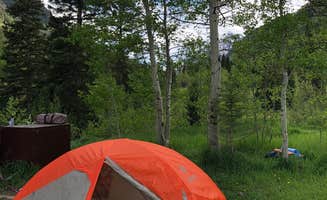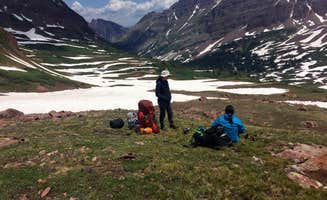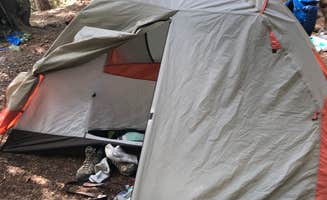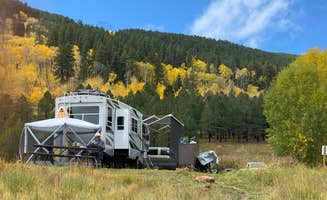Dispersed camping near Aspen provides access to the high-altitude environment of the Rockies, with most sites sitting above 8,000 feet where summer temperatures typically range from 40°F at night to 70°F during the day. The White River National Forest surrounding Aspen contains multiple wilderness areas with camping options along creeks and reservoirs that aren't mentioned in standard tourist guides. Sites along Lincoln Creek Road require high-clearance vehicles but reward campers with creek-side spots and seclusion from crowds.
What to do
Hiking to alpine lakes: From Portal Campground, access trails to several mountain lakes. "There are plenty of things to do in the area - hiking, mountain biking, fishing, etc. Overall, this is a new go to spot for me and I highly recommend it," notes Christina S. The campground sits at 10,500 feet elevation, providing immediate access to high-country trails.
Creek fishing opportunities: Fish the Frying Pan River near Chapman Campground. "The fishing was fair in the Res and we caught 2 nice browns in the river," reports Mitch K. The campground offers both reservoir and river fishing access, with trout being the primary catch.
Boating without motors: Several campgrounds provide non-motorized water access. "You can swim and fish in Chapman Reservoir. No motorized boats allowed," mentions Erin E. This creates a peaceful environment for paddleboards, canoes, and small fishing craft away from engine noise.
Winter snow activities: While most campgrounds close by late September, the areas around Aspen transform for winter recreation. During winter months, some forest service roads become cross-country ski and snowshoe routes, particularly along Independence Pass once snow closes the highway.
What campers like
Natural privacy barriers: At Difficult Campground, "Sites are well situated just up independence pass a short ways out of Aspen with great views and the sound of the roaring for river," writes Thomas S. The natural spacing between sites creates privacy without feeling isolated.
Bear safety infrastructure: Most Aspen-area campgrounds include bear-resistant storage. "There was a bear raiding vehicles at night so make sure you lock everything and use the bear boxes provided at each site," warns Megan A. These metal storage containers help protect food and scented items.
Creek sounds for sleeping: Many campers appreciate waterside sites. At Silver Bell Campground, "the view and the sound of the river makes up for it," says Erik S. The flowing water masks other camping noises and creates natural white noise.
Cold nights even in summer: The high elevation means significant temperature drops after sunset. "Temperatures dropped dramatically at night and I was happy there was no fire ban when I visited because I used my fire for a heat source in the evening and then hand warmers inside extra socks at night," explains Crystal C. Even July and August can see nighttime temperatures in the 30s.
What you should know
High-clearance vehicle requirements: Many dispersed camping spots near Aspen require capable vehicles. For Lincoln Creek Dispersed, "This is very secluded so pack in pack out, bring everything you need because the road is very rough and requires a high clearance," Connor M. explains. Standard passenger cars may not reach many of the best sites.
Early arrival necessity: Campgrounds fill quickly, especially on summer weekends. "This campground is listed as a separate campground, but is really more like a different loop from Little Maud. Beautiful views and a better bathroom," Jennifer C. notes about the connected campground loops.
Reservation limitations: While some campgrounds accept reservations, others operate first-come, first-served. "Reservations are not accepted and this is a major tourist destination so what I do when I want to camp here is I make reservations for a nearby campground and I stay there until a campsite becomes available," advises an experienced camper.
Zero cell service: Most camping spots have no connectivity. "Zero cell service. You need to drive 25 min into the town of basalt for service," reports Rebeca H. Plan communications and navigation accordingly.
Tips for camping with families
Creekside exploration sites: For family-friendly options, look for campgrounds with gentle water access. "There are plenty of places for the kids to explore, rock climb and pretend, especially between checkout and checkin time when some of the camp pads are empty," shares K.R. about camping experiences with children.
Wildlife viewing opportunities: Families can enjoy spotting native animals. "We saw moose both days on the drive into the site!" exclaims Laura J. from Little Maud Campground. "We were totally thrilled that there was a mule eared deer doe who was not shy and casually grazed under the trees at the edge of our campsite, totally ignoring us and allowing our 7 year old grandson to sneak up to get a closer look," adds Tezza G.
Weather preparation necessities: Families should pack extra layers, especially for children. "Chilly at night, plan for freezing temps in late September," Rebecca notes. Even summer camping requires warm sleeping bags and extra blankets due to the rapid temperature drops after sunset.
Multi-day planning strategy: When bringing children to Aspen's camping spots, the extra drive time warrants longer stays. Many families recommend at least 3 nights to balance the travel effort with exploration time, especially when visiting Maroon Bells and nearby attractions.
Tips for RVers
Size restrictions for mountain roads: RVers must research road limitations. "WARNING: No vehicles over 35 feet long are allowed on Highway 82 to access this campground," cautions Sean N. about access to certain campgrounds. Independence Pass is completely off-limits to larger RVs.
Leveling challenges: Many campsites in the mountains require careful positioning. "Some of the sites are tight," notes Rebeca H. "Our site had great views but it was difficult to park our trailer." Bring extra leveling blocks as most sites feature natural slopes.
Dump station availability: Limited services exist for RVs. "No dump stations at any of the three campgrounds here (they were taken out of service sometime in the last 12 years)," reports Bill R. Plan accordingly for waste management during longer stays.
Generator restrictions: Forest Service campgrounds often limit or prohibit generator use. Check regulations before arrival, as many campgrounds around Aspen emphasize natural quiet and have generator-free periods or complete bans to maintain the wilderness experience.













